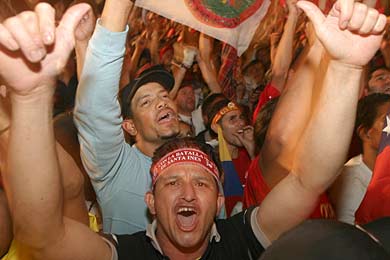There is no doubt that the Chávez model of “revolution without revolution”, of structural changes for democracy and peace, while strictly Venezuelan, nevertheless is a thermometer for Latin American countries. It demonstrates that there is no one who can stop us from dreaming of a future of popular activism, of justice and equity, of regional horizontal integration, without tutelage. This is why the president insisted that victory in the referendum transcends the Venezuelan frontiers because it is also a victory for Latin America.

The Bolivarian project is a bad example, an anti-hegemonic example. Because, for the first time in Latin America there is an agreement for a strategically offensive initiative towards a participatory, active, post-capitalist democracy (perhaps this expression will have to be further defined), and leaves behind the defensive models such as those straitjackets of the “No” forces; No to FTTA and No to dollarization.
This is why it should not be a surprise to hear what Chávez said about his new triumph: “We continue unbeaten”, he said, “they have informed me that the ball (of this enormous swing of the bat) has fallen right in the middle of the White House-it fell in the middle of the garden...a gift for Bush.” Then, very seriously, Chávez expressed his expectation that the government of the United States cease their interference, that they respect internal sovereignty, without meddling of any kind, in the issues that are of exclusive competence of Venezuelans.
To the foreign press he pointed out that, “We have no plans to take Washington by assault, of attacking the United States...but here we are prepared to be free, to defend sovereignty. Venezuela will not be a colony again; only we Venezuelans govern here. We want to have at least a relationship such as we had with President Clinton; with him one could debate and discuss things.”
Is a confrontation with the United States and its Monroe Doctrine inevitable? Everything seems to indicate that it is not. Therefore, it will all depend on the force of the actors. A lone Venezuela logically will not be able to confront it, but an integrated Caribbean- Latin America perhaps will. And it is time that our dear intellectuals stop talking of other things, of throwing the ball outside the court; it is about integration and within it, sovereign military integration, which is indispensable.
You can count the votes, but the passion, the responsibility, cannot be quantified. Chávez, disillusioned by the mid-level official leadership, bet on popular passion to carry out the campaign for the referendum, unleashing the strength of the brigades, electoral teams that today are an organized social force. They are an organizational model that is not a party, not a national front, but a mobilized people, an organized mass, “a moral force” that occupies a place in the entire geography of the country.
This electoral triumph, his eighth consecutive one, creates a new situation in the national political map because it represents the harshest reversal that his adversaries have ever had and it is the most convincing popular support given by the people to the Bolivarian process. This is why it is not strange that even days after the referendum the opposition continues to talk about fraud and incites to disobedience and rebellion.
The people that stood up to ten hours in line to exercise their right to participate, assumed that their future depended on this vote, because it was more than just about the rejection of or support for a president. The alternatives were between two models of a country, two models of the world, between a dream of the future, consolidation of a political, economic, and social project, or to block it.
Six out of every ten Venezuelans voted for the model of a Bolivarian country that seeks to overcome the political, economic and social exclusion of the great majority with an articulate social policy focused on the “missions,” which have managed to substantially improve the health and education indicators of the country.
There can be no popular activism without political consciousness and that is one of the great advances that Venezuela displays today. Today, Venezuelans want to be makers of their own destiny. August 15th was a triumph of the 1999 Bolivarian Constitution - of its referendum that ratifies a participative, activist model of democracy that guarantees a country for all, without exclusions or discriminations of any sort.
Is the destabilization over? To almost the whole world, it is clear that many did not understand participative democracy. It is clear that Venezuelans came to understand that they are subjects of politics,-not just its object-that they had been condemned by the elites and that they have the capacity and the need to be the makers of their own destiny.

 Articles by this author
Articles by this author Send a message
Send a message











Stay In Touch
Follow us on social networks
Subscribe to weekly newsletter